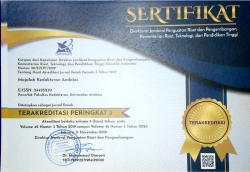Nutrient content in dadiah pudding, a potential source of probiotics from Minangkabau, West Sumatra
Abstract
Introduction: Dadiah is a fermented milk product derived from the milk of West Sumatran swamp buffaloes. Methods: The manufacture of dadiah pudding used dadiah fermented milk obtained from Bukittinggi, West Sumatra. Levels of carbohydrate, protein, fat, calcium, zinc, and iron were measured according to the Indonesian National Standard, then total calories were determined using 4:4:9 kcal/g conversion. Inoculation of samples on de Man, Rogosa, and Sharpe agar was performed to determine total lactic acid bacteria counts, and Gram staining was done for further morphological confirmation. Results: The result revealed that 100 g dadiah pudding contained 6.49 g of carbohydrates, 6.12 g of protein, 23.31 g of fat, 260.23 kcal of calories, 276.61 mg of calcium, 3.75 mg of zinc, 6.60 mg of iron, and 6.1 × 10⁹ CFU/ml of lactic acid bacteria assuming that modification of the liquid into pudding form has been shown to impact macronutrient, micronutrients, total calories, and total lactic acid bacteria. Conclusion: The nutrient content in dadiah pudding revealed in this study indicates that this dairy product can be used as a nutritious local food source and a potential probiotic.
Keywords
Full Text:
PDFReferences
Surono IS. Indonesian Dadih. In: Puniya AK, ed. Fermented Milk and Dairy Products. CRC Press; 2015:377-399.
Arasj F. Pengaruh Pemberian Dadih (Susu Kerbau Terfermentasi) melalui Makanan Tambahan terhadap Status Gizi, Kejadian Diare dan ISPA Anak Pendek (Stunted) Usia 1-4. Jurnal Ilmu Kesehatan ‘Afiyah. 2011; 1:1-8.
Suharti N, Linosefa L, Kumala A, Chundrayetti E, Putra A. The Effect of Dadiah Feeding of Breastfeeding Women with Normal Flora of Digestive Tract. In: Proceedings of the Proceedings of the 1st EAI International Conference on Medical and Health Research (ICoMHER), Padang, Indonesia, Nov 13-14th 2018. EAI; 2019. https://doi.org/10.4108/eai.13-11-2018.2283649
Surono IS, Martono PD, Kameo S, Suradji EW, Koyama H. Effect of probiotic L. plantarum IS-10506 and zinc supplementation on humoral immune response and zinc status of Indonesian pre-school children. Journal of Trace Elements in Medicine and Biology. 2014;28(4):465-469. https://doi.org/10.1016/j.jtemb.2014.07.009
Collado MC, Surono IS, Meriluoto J, Salminen S. Potential Probiotic Characteristics of Lactobacillus and Enterococcus Strains Isolated from Traditional Dadih Fermented Milk against Pathogen Intestinal Colonization. J Food Prot. 2007;70(3):700-705. https://doi.org/10.4315/0362-028x-70.3.700
Prakoeswa CRS, Herwanto N, Prameswari R, Astari L, Sawitri S, et al. Lactobacillus plantarum IS-10506 supplementation reduced SCORAD in children with atopic dermatitis. Benef Microbes. 2017;8(5):833-840. https://doi.org/10.3920/bm2017.0011
Kodariah R, Armal HL, Wibowo H, Yasmon A. The effect of dadih in BALB/c mice on pro-inflammatory and anti-inflammatory cytokine productions. Journal of the Medical Sciences. 2019; 51(4):292-300. https://doi.org/10.19106/JMedSci005104201902
Bermudez-Brito M, Plaza-Díaz J, Muñoz-Quezada S, Gómez-Llorente C, Gil A. Probiotic Mechanisms of Action. Ann Nutr Metab. 2012; 61(2):160-174. https://doi.org/10.1159/000342079
Ministry of Health of Indonesia. Indonesian Food Composition Data. Jakarta: Ministry of Health of Indonesia. 2018
Taufiqa Z, Chandra DN, Helmizar H, Lipoeto NI, Hegar B. Micronutrient Content and Total Lactic Acid Bacteria of Dadiah Pudding as Food Supplementation for Pregnant Women. Open Access Maced J Med Sci. 2021; 9(B):1149-1155. https://doi.org/10.3889/oamjms.2021.6791
Surono IS, Hosono A. Performance of Dadih Cultures in Fluid Milk Application at Low Temperature Storage. Asian-Australas J Anim Sci. 2000; 13(Supplement July 2000 A):495-498.
Amelia R, Philip K, Pratama YE, Purwati E. Characterization and probiotic potential of lactic acid bacteria isolated from dadiah sampled in West Sumatra. Food Science and Technology. 2021; 41(suppl 2):746-752.
National Standardization Agency of Indonesia. Yoghurt SNI 2981:2009. Jakarta: National Standardization Agency of Indonesia. 2009
Codex Alimentarius Commission. Milk and Milk Products 2nd Edition. Rome: FAO/WHO. 2011.
Maryana TA, Suparti. Organoleptik Dan Daya Simpan Dadih Susu Sapi Dengan Inovasi Bambu Kering Dan Suhu Yang Berbeda Selama Penyimpanan [thesis]. Surakarta: Universitas Muhammadiyah Surakarta. 2014.
Helmizar, Yuswita E, Putra AE. Analysis of the Nutrients and Microbiological Characteristics of the Indonesian Dadih as a Food Supplementation. Glob J Health Sci. 2018; 11(1):155.
Surono IS. Traditional Indonesian dairy foods. Asia Pac J Clin Nutr. 2015; 24(Suppl 1): S26-30.
Venema K, Surono IS. Microbiota composition of dadih - a traditional fermented buffalo milk of West Sumatra. Lett Appl Microbiol. 2019; 68(3): 234-240. https://doi.org/10.1111/lam.13107
Noviasari D. Pengaruh suhu dan pH terhadap aktivitas enzim protease dari Bacillus mycoides yang ditumbuhkan dalam media campuran limbah cair tahu dan dedak [thesis]. Malang: Universitas Islam Negeri Maulana Malik Ibrahim. 2013
Helmizar, Surono IS. Characteristics of Amino Acid, Micronutrient and Probiotic Isolated from Dadih and Their Benefits for Pregnant Mothers and Outcomes in West Sumatra, Indonesia. Glob J Health Sci. 2020; 12(1):116-123.
Ministry of Health of Indonesia. Dietary Intake Reference in Indonesia. In: Regulation of the Minister of Health of the Republic of Indonesia Number 28 of Year 2019. Jakarta: Ministry of Health of Indonesia. 2019
Peng M, Aryal U, Cooper B, Biswas D. Metabolites produced during the growth of probiotics in cocoa supplementation and the limited role of cocoa in host-enteric bacterial pathogen interactions. Food Control. 2015; 53: 124-133. https://doi.org/10.1016/j.foodcont.2015.01.014





















